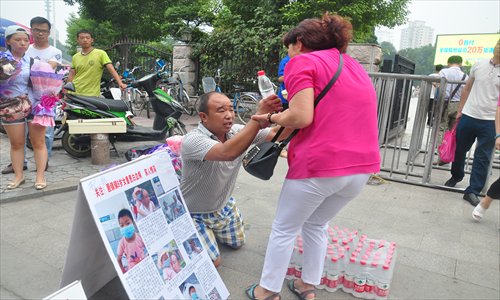Mother stealing for sick child highlights poverty caused by serious illness

A woman gives 200 yuan ($30) to Li Junqiang, who sold bottled water on the streets in Kaifeng, Henan Province to earn money for his sick 9-year-old daughter. Li has spent over 140,000 yuan on treating his daughter's illness. Photo: IC
The touching story of a down-on-her-luck mother who shoplifted small gifts for her sick child prompted thousands of people to donate money online, but also highlighted the flaws in China's social security system.
On May 31, Liu Jinxia, a 36-year-old single mother with two daughters from a village in Dezhou, East China's Shandong Province, was caught stealing a chicken drumstick and a children's book from a supermarket in Nanjing, capital of East China's Jiangsu Province.
Police decided not to arrest her due to the tiny value of the goods, Nanjing-based the Modern Express reported.
The things she stole would have been Children's Day gifts for her 8-year-old daughter Dashuang, who had asked for a chicken leg while receiving treatment for nephritic syndrome, a chronic disease that is difficult to cure. Liu decided that she had to steal the gifts as she was unable to pay for them.
An online fund-raising event for Dashuang was then held on Sina Weibo on June 1 and more than 300,000 yuan ($45,570) was donated in only two hours, according to the Modern Express.
Even though this sad story seems to have had a happy ending, for thousands of other families in a similar position there is no light at the end of the tunnel, many are not getting the help that they need, especially if they seek help away from their home regions.
Individual reports
"Please write a report about us," Wang Yuqin begged reporters who came to interview Liu and Dashuang, news site thepaper.cn reported. Wang is from a rural part of East China's Anhui Province and has two daughters with severe kidney disease that are being treated in the same Nanjing hospital ward as Dashuang
Wang Guohua, whose son is receiving dialysis in the same ward, felt shocked and left out when he saw floods of people coming to donate money to Liu and Dashuang.
"Is it [because] we did not steal anything?" Wang Guohua asked.
The key to getting donations is publicity, according to Zhou Di, communications officer at a Beijing-based non-profit organization.
She added that "when we are preparing to raise funds, we need to figure out a way to make sure the public are interested in it."
"As it was reported on Children's Day, Liu's story was quite impactful," Zhou said.
People who are unable to benefit from public sympathy "now need a system that is designed to make sure that it is the social assistance system that can help them rather than relying on media reports about individual cases," Peng Xizhe, dean of the School of Social Development and Public Policy at Shanghai's Fudan University, told the Global Times.
It would be better if there were more "open and easy-to-approach" channels through which people could apply for the support of the government and media, Zhou suggested.
Local level
For single mothers like Liu, the cost of giving her daughter the treatment she needs is unaffordable even though she receives 900 yuan a month in government assistance.
"[My daughter] has been receiving treatment in hospital recently and it costs about 100-200 yuan a day," Liu was quoted by the Modern Express as saying. Liu is only able to earn about 40 yuan a day working in a recycling station in Xuyi, Jiangsu.
To help with the costs, Liu and her two daughters joined the rural medicine insurance system.
However, only about a third of Dashuang's medical fees were covered by this program as their household registration was in Shandong rather than Jiangsu.
"Our current medical insurance system only solves issues related to minor diseases, while we haven't done enough in terms of critical illness insurance," Peng said.
The funds for social insurance, including pensions and medical programs, are pooled locally and then spent locally, Peng said.
He added that social insurance, which is now only structured at the provincial or sub-provincial level, should be arranged nationally.
"The State should make an overall plan that covers the relevant funds to improve the security level for low-income people," Li Hao, deputy head of the Institute for Advanced Studies in Humanities and Social Sciences at Beihang Univeristy, was quoted by the Legal Daily as saying.
"The State should entirely cover medical expenses that exceed a certain amount so as to avoid poverty caused by critical illness," Li added.
Newspaper headline: No cash for cures